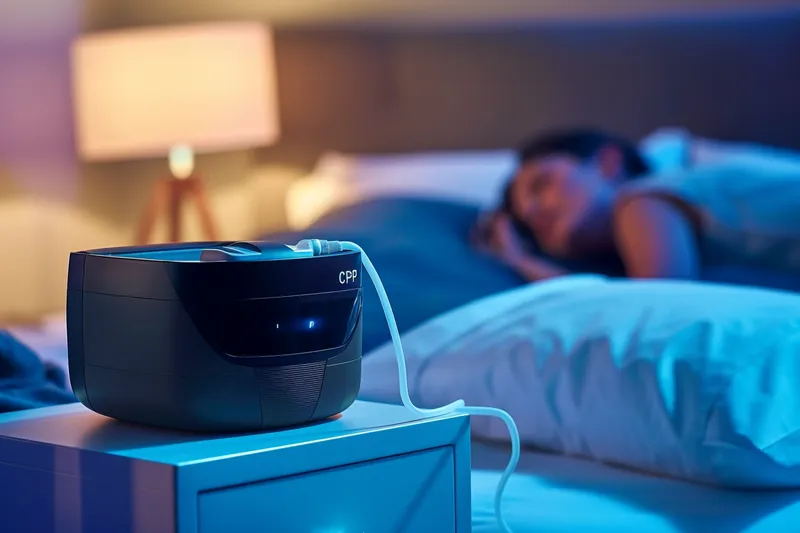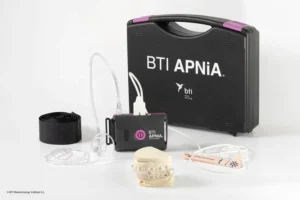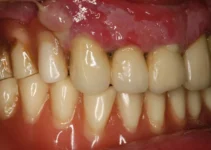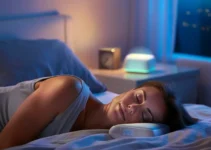A CPAP device plays a critical role in managing sleep apnea, a condition marked by frequent pauses in breathing during sleep. This device works by maintaining a steady flow of air into the respiratory system, keeping the airways open and enabling uninterrupted breathing. Understanding how to effectively use and maintain your CPAP device can significantly improve your sleep quality and overall health. This article will explore the key benefits of using a CPAP device, offering insights into how it can alleviate symptoms of sleep apnea and enhance your daily energy levels.
How CPAP Devices Work
Continuous Positive Airway Pressure (CPAP) devices are a common treatment for patients with sleep apnea, especially those with more severe forms of the condition. These devices work by providing a constant stream of air through a mask, which keeps the airways open and prevents the collapse that characterizes apnea episodes. The effectiveness of CPAP devices has been well-documented in numerous studies, making them a cornerstone in sleep apnea therapy.
Understanding the mechanism and types of CPAP devices can help patients and healthcare providers choose the most appropriate treatment plan. Notably, CPAP devices can be particularly beneficial for patients who do not respond well to other treatments, such as lifestyle changes or oral appliances.

Let’s delve into the mechanism and different types of CPAP devices to provide a comprehensive understanding of how these devices function.
Mechanism of CPAP Devices
The primary mechanism of CPAP devices is quite simple and highly effective. The device consists of a motor that generates a continuous stream of air, which is delivered through a hose connected to a mask worn over the nose or mouth. This steady flow of air creates a pressure that keeps the throat muscles from collapsing, thereby maintaining an open airway throughout the night. By preventing airway obstruction, CPAP devices drastically reduce the frequency and severity of apnea episodes. Additionally, the air pressure settings can be adjusted based on individual needs. Most modern CPAP devices come with an auto-titrating feature, which automatically adjusts the pressure levels in response to the patient’s breathing patterns. This personalized adjustment is crucial for maximizing comfort and treatment efficacy.
The benefits of CPAP include improved sleep quality, reduced daytime sleepiness, and a decrease in associated health risks such as hypertension and cardiovascular disease. Chronic snoring is also significantly reduced, enhancing the sleep quality of both the patient and their partner.
Types of CPAP Devices
There are several types of CPAP devices available, each designed to meet specific patient needs. The most common types include:
- Standard CPAP: This is the most basic type and delivers a single, constant pressure throughout the night.
- Auto CPAP (APAP): This device adjusts the air pressure automatically based on the patient’s breathing patterns, providing more comfort and potentially greater efficacy.
- Bilevel CPAP (BiPAP): These devices have two pressure settings – one for inhalation (higher pressure) and one for exhalation (lower pressure), which can be more comfortable for some patients.
Choosing the right type of CPAP device is crucial and should be done in consultation with a healthcare provider. Factors such as the severity of the condition, patient comfort, and specific medical needs will influence this decision.
For patients with mild to moderate sleep apnea who might not tolerate CPAP well, alternative treatments such as personalized splints can be considered. These oral devices are particularly useful for those who find CPAP uncomfortable or disruptive to their sleep.
By staying informed and consulting with specialists, patients can find the most suitable treatment options, improving their quality of life and overall health. For further insights and personalized advice, be sure to explore our other articles on sleep apnea treatments.
Benefits of Using a CPAP Device
A Continuous Positive Airway Pressure (CPAP) device is a common treatment for sleep apnea. This machine uses a hose connected to a mask or nosepiece to provide a constant flow of air, which helps keep the airways open during sleep. Utilizing a CPAP device can offer numerous benefits for individuals suffering from sleep apnea. In this article, we will explore some of the key advantages, including improved sleep quality, a reduced risk of cardiovascular issues, and enhanced daytime alertness.
Improved Sleep Quality
One of the most immediate benefits of using a CPAP device is the significant improvement in sleep quality. Sleep apnea often causes repeated awakenings throughout the night as the body struggles to breathe. These disturbances not only impair the sleep cycle but also lead to a feeling of exhaustion the next day. CPAP therapy helps to maintain an open airway, preventing these interruptions and allowing for a more restful and uninterrupted sleep.
Studies have consistently shown that patients who use CPAP devices experience a marked reduction in the number of apnea events per hour. This improvement translates to better overall sleep architecture and increased time spent in restorative sleep stages such as REM and deep sleep. Improved sleep quality can have a cascading effect on various aspects of health, from mood regulation to cognitive function.
Furthermore, enhancements in sleep quality can also lead to better quality of life. Patients often report feeling more refreshed and energetic, which impacts their ability to perform daily activities efficiently and with less fatigue.
Reduced Risk of Cardiovascular Issues
Sleep apnea is strongly linked to cardiovascular problems, including hypertension (high blood pressure), heart disease, and even stroke. One of the major benefits of using a CPAP device is the significant reduction in cardiovascular risk. Continuous use of CPAP can help in lowering blood pressure, particularly during nighttime, which is crucial for cardiovascular health.
Research indicates that untreated sleep apnea can lead to chronic levels of elevated blood pressure, which is a significant risk factor for developing heart disease. By ensuring a consistent airway, the CPAP device helps in stabilizing blood pressure and reducing the load on the heart.
Proper management of sleep apnea through CPAP therapy also decreases the chances of other cardiovascular events. For instance, studies have found a lower incidence of atrial fibrillation and other heart arrhythmias among CPAP users. Thus, using a CPAP device can serve as a preventive measure against several serious cardiovascular conditions.
Enhanced Daytime Alertness
Another notable benefit of CPAP therapy is the enhancement of daytime alertness. Owing to frequent awakenings during the night, individuals with sleep apnea often suffer from excessive daytime sleepiness. This not only affects their productivity but also poses safety risks, such as an increased likelihood of motor vehicle accidents. By ensuring a more restful and uninterrupted night’s sleep, CPAP usage significantly improves daytime alertness and cognitive function. People notice better focus, quicker reaction times, and an overall improvement in mental acuity. This enhancement can positively affect both personal and professional aspects of life.
In addition to increased alertness, CPAP therapy can alleviate other symptoms commonly associated with sleep apnea, such as morning headaches and irritability. These changes contribute to a general sense of well-being and improve one’s ability to engage in social interactions and complex tasks.
If you’re interested in learning more about how CPAP devices can benefit you or exploring other treatment options for sleep apnea, be sure to read our other articles on this topic.
Tips for Effective CPAP Device Usage
The Continuous Positive Airway Pressure (CPAP) device is a commonly prescribed treatment for patients suffering from Sleep Apnea-Hypopnea Syndrome (SAHS). While CPAP is highly effective, its success greatly depends on how it is used. Below are some key tips to ensure you get the most out of your CPAP therapy.
To maximize the benefits of your CPAP device, consider the following aspects: regular cleaning and maintenance and ensuring a proper mask fit and comfort. Implementing these tips can significantly enhance your treatment experience and outcomes.
Regular Cleaning and Maintenance
One of the most critical aspects of CPAP therapy is maintaining the cleanliness of your device. Regular cleaning is essential to prevent the buildup of bacteria, mold, and other potentially harmful pathogens. Studies show that a clean CPAP machine can significantly reduce the risk of respiratory infections.
Here are some steps for effective CPAP cleaning and maintenance:
- Wash your mask, tubing, and water chamber daily with mild soap and water.
- Rinse thoroughly and allow all components to air dry completely before reassembly.
- Replace the mask, tubing, and filters as recommended by the manufacturer to ensure optimal performance.
Neglecting regular cleaning can lead to the accumulation of allergens and irritants, which can exacerbate respiratory conditions. Therefore, sticking to a cleaning schedule is crucial for maintaining both the efficacy of the device and your health.
Proper Mask Fit and Comfort
A CPAP mask that fits well is fundamental for effective treatment. An ill-fitting mask can lead to air leaks, reducing the device’s effectiveness and causing discomfort. Ensuring a proper fit can drastically improve the quality of your sleep and the overall success of your therapy.
Consider the following tips for finding and maintaining a comfortable mask fit:
- Consult with your healthcare provider to find the mask type and size that best suits your facial structure.
- Regularly adjust the straps to ensure a snug yet comfortable fit without overtightening.
- Use mask liners or pads to reduce skin irritation and cushion pressure points.
Experimenting with different mask styles and sizes can make a significant difference in your comfort and treatment adherence. Do not hesitate to seek professional advice if you experience issues with mask fit.
By incorporating these tips into your routine, you can enhance the effectiveness of your CPAP therapy and improve your quality of life. For additional insights and advice, be sure to explore our other articles on CPAP usage and maintenance.
Understanding CPAP Device Alternatives in Dental Clinics
For patients struggling with sleep apnea, a CPAP (Continuous Positive Airway Pressure) device is often recommended. However, some patients may reject or not tolerate it well. Dental clinics are increasingly involved in the detection and management of mild to moderate sleep apnea and chronic snoring using personalized splints.
How can dental clinics help manage sleep apnea without using a CPAP device?
Dental clinics can provide custom-made oral splints aimed at managing sleep apnea. These personalized splints help by adjusting the position of the jaw and tongue during sleep, which can alleviate the blockage of the airway. This is a viable option for patients who find the CPAP machine uncomfortable or restrictive, especially those with mild to moderate sleep apnea.
Why is treatment in a dental clinic effective for some sleep apnea patients?
Dental clinics play a crucial role not only in detecting but also in treating sleep apnea due to the direct relationship between oral health and sleep-related disorders. Through the use of specialized devices like APNiA, dentists can diagnose and treat sleep apnea effectively. These devices not only manage snoring but can also moderate sleep apnea, making dental clinics a good alternative for patients unable to tolerate CPAP machines.

My name is Salman Kapa, a 73-year-old expert in bone regeneration and dental implantology. With decades of experience in the field, I am dedicated to advancing our understanding of oral health and hygiene. Through my research and writing, I aim to contribute to the development of innovative solutions in dental care.




